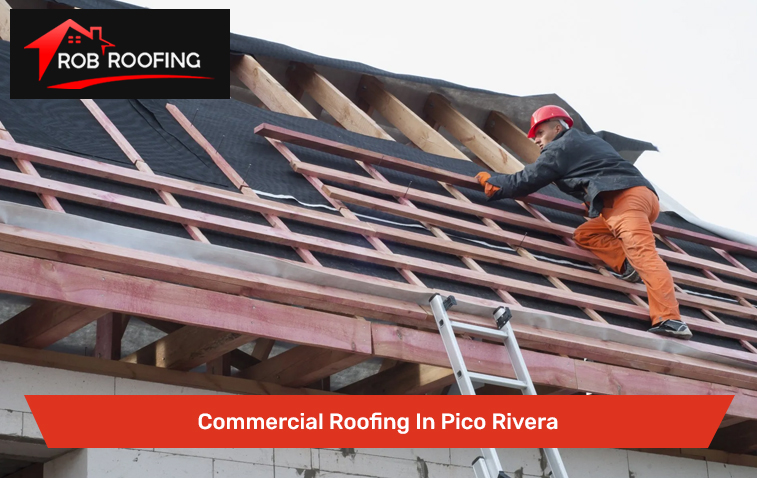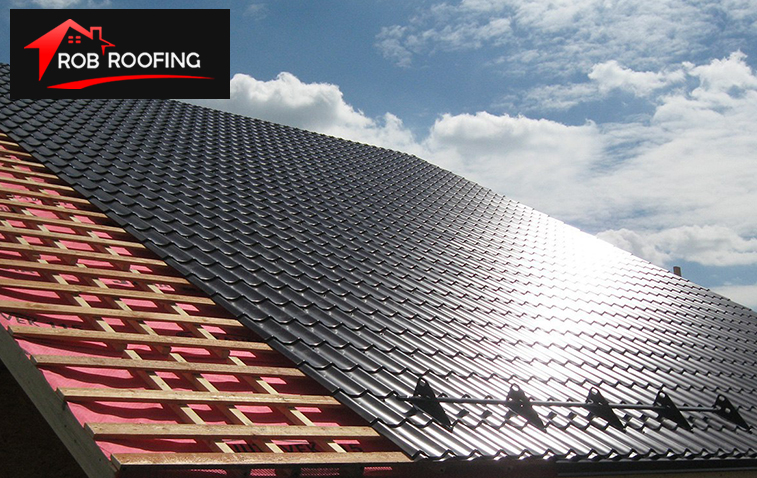Commercial Roofing in Pico Rivera
Commercial roofing in Pico Rivera requires adherence to specific rules and regulations to ensure safety and durability. Get in touch and hire a professional roofing contractor, for several reasons. Firstly, you get the necessary expertise and experience to navigate the complexities of commercial roofing projects

As a professional contractor, we are well-versed in local building codes and regulations, guaranteeing compliance and avoiding potential legal issues. We help you work with high-quality materials and advanced equipment, ensuring a reliable and long-lasting roofing system. Moreover, you get warranties and insurance, offering peace of mind in case of any unforeseen damages or issues. Choose the right contractor to ensure the highest standards of workmanship, protect your investments, and minimize risks associated with subpar roofing installations.
Things We Do for Commercial Roofing
When it comes to commercial roofing in Pico Rivera, there are several principles that should be followed to ensure compliance, safety, and longevity of the roofing system. Here are some key principles:
Adhere to Building Codes
Familiarize yourself with the local building codes and regulations specific to commercial roofing in Pico Rivera. Ensure that your roofing project meets all the necessary requirements and obtains the required permits
Quality Materials
Use high-quality roofing materials that are suitable for commercial applications. This ensures durability, longevity, and resistance to weather elements prevalent in the Pico Rivera area.
Proper Installation
Ensure that the roofing system is installed correctly, following the manufacturer’s guidelines and industry best practices. Improper installation can lead to leaks, premature deterioration, and costly repairs
Regular Inspections and Maintenance
Schedule regular inspections and maintenance to identify and address any issues promptly. This helps prevent small problems from escalating into major roofing failures and extends the lifespan of the roof.
Energy Efficiency
Consider energy-efficient roofing options, such as reflective or cool roofing systems, to reduce energy consumption and lower cooling costs for the building.
Safety Measures
Implement proper safety protocols during the roofing project to protect workers and comply with occupational health and safety regulations. This includes providing necessary safety equipment and ensuring a safe work environment.
Building Codes and Regulations to Follow
During commercial roofing projects in Pico Rivera, it is essential to adhere to the local building codes and regulations. While the specific codes may vary over time, some of the common building codes that may apply to commercial roofing in Pico Rivera include:
California Building Code (CBC)
Pico Rivera follows the California Building Code, which provides comprehensive regulations for construction, including roofing. It covers structural requirements, fire safety, materials, and installation standards
International Building Code (IBC)
Pico Rivera also adopts the International Building Code, which provides guidelines for building construction and addresses aspects such as structural design, fire safety, and occupancy requirements.
Energy Efficiency Standards
Pico Rivera, being located in California, is subject to state energy efficiency standards. Compliance with regulations like Title 24 is necessary to ensure the roof’s energy performance and insulation meet the required standards.
Fire Codes
Pico Rivera follows fire codes that include regulations for fire-resistant materials, roof assemblies, and fire safety measures, aiming to enhance overall fire protection within commercial buildings.
Planning for Commercial Roof Design
When planning for a commercial roof design, there are several important factors to consider. As a professional in commercial roofing in Pico Rivera. Here are some key aspects to keep in mind

Function and Purpose
Understand the specific requirements of the commercial building and the intended use of the roof. Consider factors such as load-bearing capacity, accessibility, and any specific equipment or systems that need to be accommodated on the roof.
Climate and Weather Conditions
Consider the local climate and weather patterns when designing the roof. Account for factors such as rainfall, wind speeds, and temperature variations. The roof design should be able to withstand and provide proper insulation against the prevailing weather conditions.
Roofing Materials
Choose appropriate roofing materials based on durability, longevity, and the specific requirements of the building. Consider factors such as weather resistance, maintenance needs, energy efficiency, and aesthetic appeal
Drainage and Water Management
Proper drainage is crucial for commercial roofs. Design the roof with adequate slope and incorporate efficient drainage systems, such as gutters, downspouts, and scuppers, to ensure effective water management and prevent ponding or water damage
Energy Efficiency
Incorporate energy-efficient features into the roof design, such as reflective or cool roofing materials, or insulation. Energy-efficient roofs can help reduce energy consumption and contribute to sustainability goals.
Maintenance and Accessibility
Plan for ease of maintenance and accessibility for future inspections, repairs, and equipment installations. Consider access points, walkways, and safety measures to ensure that maintenance personnel can safely access different areas of the roof.
Architectural Style
The roof design should align with the overall architectural style and aesthetic of the building. Consider the visual impact and choose materials, colors, and finishes that enhance the building’s appearance and contribute to its overall design.
Budget and Cost Considerations
Evaluate the budget for the roof design and balance it with the desired features and requirements. Consider long-term costs, such as maintenance and lifecycle expenses, when making material and design choices
The Different Designs for Commercial Roofing in Pico Rivera
| Type of Roof | Description |
|---|---|
| Flat Roof | This is one of the most common types of commercial roof designs. It features a low-sloped or completely flat surface. Flat roofs are relatively easy to construct and maintain, and they provide ample space for HVAC equipment, solar panels, and other installations. |
| Low-Slope Roof | Similar to flat roofs, low-slope roofs have a slight pitch or slope to facilitate water drainage. They are popular for commercial buildings and are often covered with single-ply membranes, built-up roofing, or modified bitumen systems. |
| Pitched Roof | Although more commonly associated with residential buildings, pitched roofs can also be found in commercial construction. They have a steep slope, allowing for efficient water runoff and providing additional architectural appeal. Pitched roofs can be covered with various materials, including shingles, tiles, or metal. |
| Metal Roof | Metal roofs are a durable and long-lasting option for commercial buildings. They can be made of steel, aluminum, or other metals and are known for their resistance to fire, extreme weather conditions, and low maintenance requirements. Metal roofs can have different profiles, such as standing seam or corrugated. |
| Built-Up Roofing (BUR) | BUR systems consist of multiple layers of bitumen and reinforcing fabrics, creating a waterproof membrane. These roofs are highly durable and can withstand foot traffic and exposure to the elements. BUR systems are commonly used on flat or low-slope commercial roofs. |
| Single-Ply Membrane Roofing: | Single-ply membranes are flexible sheets of synthetic materials that are mechanically attached, adhered, or ballasted to the roof surface. The most common types are TPO (thermoplastic polyolefin) and EPDM (ethylene propylene diene monomer). Single-ply roofing offers good energy efficiency and ease of installation. |
